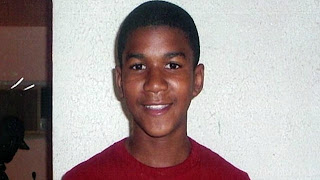"I Thought it would be Charles"
Better minds than mine have analyzed the Trayvon Martin tragedy and better writers than I have expounded on it. It would seem there would be little to add.
But I write nonetheless because I know Trayvon's case is not unique. There have been many Trayvons.
During my seminary years, I spent ten weeks one summer doing Clinical Pastoral Education at an inner city hospital setting. I had regular floors and departments that were my "parishes," and every sixth night and sixth weekend day, the entire hospital was mine to cover. Throughout that time, I never had a single night where I was not awakened from my on-call room to come to the Trauma Unit because of a shooting. Larcenia, a young black girl who had been sitting on her front steps in search of some cooler air than in her row house, was the exception; she was the victim of a senseless drive-by shooting and she never walked again, never had feeling of any kind from her mid-section down. Larcenia was 14.
But, as I said, she was the exception. Because more often than not, it was a young black male who had been shot. Sometimes it was an act of vengeance; sometimes there was gunfire from multiple players. And sometimes it was random, thoughtless shooting. Perhaps for sport.
One night the victim was a young black man named John. He was seventeen years old. He lived, thank God, but not without compromises in his quality of life. My job was to talk with him, to get his identification information, and to ask him who I should call at home. John was a sweet guy. He had no idea who had shot him or why. He believed it had been a white guy in a car. And he asked me to phone his grandmother. When I reached the lady, I told her as gently as I could that I was the hospital chaplain, that John had been admitted, and he was alive and talking to me, and wondered if there was someone who could bring her to the emergency room. I'll never forget what she said to me: "Did you say it was John that was shot? I always thought it would be Charles who would get shot."
It was unfathomable to me that this woman, and probably many, many other African-American mothers and grandmothers actually lived with the expectation that their sons and grandsons would be shot. I couldn't wrap my mind around it -- and I've later learned that this is due to white privilege.
That summer was nineteen years ago. How little progress, if any at all, we have made.

But I write nonetheless because I know Trayvon's case is not unique. There have been many Trayvons.
During my seminary years, I spent ten weeks one summer doing Clinical Pastoral Education at an inner city hospital setting. I had regular floors and departments that were my "parishes," and every sixth night and sixth weekend day, the entire hospital was mine to cover. Throughout that time, I never had a single night where I was not awakened from my on-call room to come to the Trauma Unit because of a shooting. Larcenia, a young black girl who had been sitting on her front steps in search of some cooler air than in her row house, was the exception; she was the victim of a senseless drive-by shooting and she never walked again, never had feeling of any kind from her mid-section down. Larcenia was 14.
But, as I said, she was the exception. Because more often than not, it was a young black male who had been shot. Sometimes it was an act of vengeance; sometimes there was gunfire from multiple players. And sometimes it was random, thoughtless shooting. Perhaps for sport.
One night the victim was a young black man named John. He was seventeen years old. He lived, thank God, but not without compromises in his quality of life. My job was to talk with him, to get his identification information, and to ask him who I should call at home. John was a sweet guy. He had no idea who had shot him or why. He believed it had been a white guy in a car. And he asked me to phone his grandmother. When I reached the lady, I told her as gently as I could that I was the hospital chaplain, that John had been admitted, and he was alive and talking to me, and wondered if there was someone who could bring her to the emergency room. I'll never forget what she said to me: "Did you say it was John that was shot? I always thought it would be Charles who would get shot."
It was unfathomable to me that this woman, and probably many, many other African-American mothers and grandmothers actually lived with the expectation that their sons and grandsons would be shot. I couldn't wrap my mind around it -- and I've later learned that this is due to white privilege.
That summer was nineteen years ago. How little progress, if any at all, we have made.

Comments
sharon